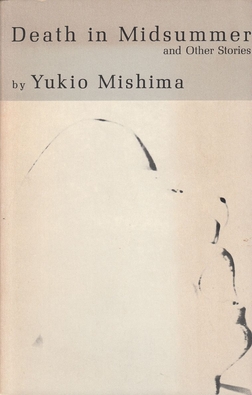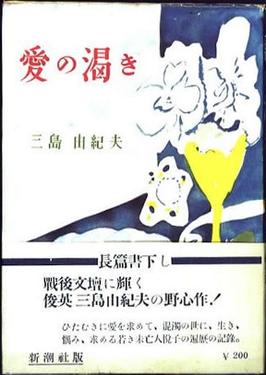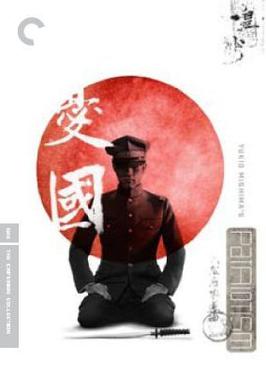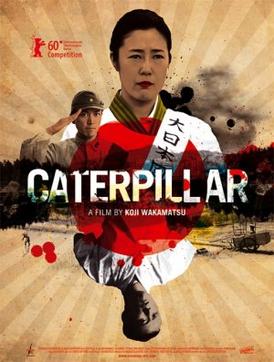
Yukio Mishima, born Kimitake Hiraoka, was a Japanese author, poet, playwright, actor, model, Shintoist, ultra-nationalist, and leader of an attempted coup d'état which culminated in his suicide. Mishima is considered one of the most important postwar stylists of the Japanese language. He was nominated for the Nobel Prize in Literature five times in the 1960s—including in 1968, but that year the award went to his countryman and benefactor Yasunari Kawabata. His works include the novels Confessions of a Mask and The Temple of the Golden Pavilion, and the autobiographical essay Sun and Steel. Mishima's work is characterized by "its luxurious vocabulary and decadent metaphors, its fusion of traditional Japanese and modern Western literary styles, and its obsessive assertions of the unity of beauty, eroticism and death", according to author Andrew Rankin.
The Tatenokai or Shield Society was a private militia in Japan dedicated to traditional Japanese values and veneration of the Emperor. It was founded and led by author Yukio Mishima. The private militia was officially founded in 1968 for the purpose of preventing indirect aggression by proponents of foreign ideology seeking to destroy Japanese traditional culture, and protecting the dignity of the Emperor as a symbol of Japan's national identity.

Eikoh Hosoe was a Japanese photographer and filmmaker who emerged in the experimental arts movement of post-World War II Japan. Hosoe is best known for his dark, high contrast, black and white photographs of human bodies. His images are often psychologically charged, exploring subjects such as death, erotic obsession, and irrationality. Some of his photographs reference religion, philosophy and mythology, while others are nearly abstract, such as Man and Woman # 24, from 1960. He was professionally and personally affiliated with the writer Yukio Mishima and experimental artists of the 1960s such as the dancer Tatsumi Hijikata, though his work extends to a diversity of subjects. His photography is not only notable for its artistic influence but for its wider contribution to the reputations of his subjects.

Mishima: A Life in Four Chapters is a 1985 biographical drama film directed by Paul Schrader from a screenplay he co-wrote with his brother Leonard and Leonard's wife Chieko Schrader. The film is based on the life and work of Japanese writer Yukio Mishima, interweaving episodes from his life with dramatizations of segments from his books The Temple of the Golden Pavilion, Kyoko's House, and Runaway Horses. Francis Ford Coppola and George Lucas were executive producers of the film, which has a musical score composed by Philip Glass and production design by Eiko Ishioka.

Death in Midsummer and Other Stories is a 1966 collection of English translations of stories by Japanese writer Yukio Mishima. The book takes its name from the included short story of the same title.

Thirst for Love is a 1950 novel by the Japanese writer Yukio Mishima. The word "kawaki" literally means thirst, but has a sense of parched dryness associated with it.

Acts of Worship is a 1965 short story collection by the Japanese writer Yukio Mishima. Kimitake Hiraoka, or better known as Yukio Mishima was a one of Japan's most famous authors. In addition, he is also known as being one of the greatest writers of the 20th century due to both his fictional and non-fictional works. His work, "Acts of Worship" took him most of Yukio Mishima's career to complete. "Act of Worship" consists of seven stories titles "Fountains in the Rain", "Raisin Bread", "Sword" "Sea and Sunset", "Cigarette", "Martydom", and finally "Act of Worship". The story titled "Sword" may be the most typical one out of the seven.

Patriotism or the Rite of Love and Death is a 1966 Japanese short film directed by Yukio Mishima. It is based on Mishima's short story "Patriotism", published in 1960.
Yuya Sato is a Japanese novelist from Hokkaido Prefecture. He won the 21st Mephisto Prize for Flicker Style, and the 20th Yukio Mishima Prize for 1000 Novels and Backbeard. His works have been translated into English, Chinese and Korean. Sato's short story "Same As Always" was translated for The Penguin Book of Japanese Short Stories (2018), and has been described as "an acerbic meditation on the complex interplay of gender and nurturing in post-Fukushima Japan."

Caterpillar is a 2010 Japanese drama film directed by Kōji Wakamatsu, partially drawn from Edogawa Ranpo's banned short-story "The Caterpillar".
"Patriotism" is a short story by Japanese writer Yukio Mishima. It was first published in the January 1961 winter issue of Shōsetsu Chūōkōron (小説中央公論), which was published by Chūōkōron-sha in December 1960.
Afraid to Die is a 1960 Japanese yakuza film directed by Yasuzo Masumura and starring Yukio Mishima.
Kinkaku-ji, or Temple of the Golden Pavilion, is a Buddhist temple in Kyoto, Japan, made famous in 1950 when it was destroyed by arson after surviving World War II intact.
Black Lizard may refer to:
The Sword is a 1964 Japanese film directed by Kenji Misumi. From a screenplay by Kazuro Funabashi, based upon the short story Ken (Sword) by Yukio Mishima.
"Star" is a short story by Yukio Mishima. It was originally published in the November 1960 issue of Gunzo, a literary magazine published by Kodansha. It was later included alongside "Patriotism" and "Hyakuman'en senbei" in the short story collection of the same name, Sutā (スタア), which was published on 30 January 1961 by Shinchosha.
Death in Midsummer may refer to:
Death in Midsummer is a short story by Japanese writer Yukio Mishima first published in October 1952.
Island of Death may refer to:
This page is based on this
Wikipedia article Text is available under the
CC BY-SA 4.0 license; additional terms may apply.
Images, videos and audio are available under their respective licenses.







